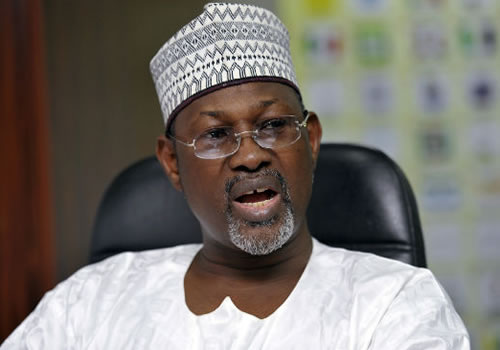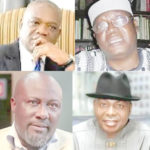Former chairman of the Independent National Electoral Commission (INEC), Professor Attahiru Jega, was the guest speaker at the 2019 Gani Fawehinmi Annual Scholarship Awards held in Lagos recently. He spoke on constitutional amendment, even as he made recommendations on how to solve the problem of unequal social injustice. SEGUN KASALI reports:
RECENTLY, a global aid agency, Oxfam Nigeria, declared that Nigeria topped the list of countries in which the gap between the rich and the poor had worsened in an index spotlighting those nations doing least to bridge the divide. It said that another African country, Ghana, experienced an impressive economic growth over the past 20 years and, within the same period, witnessed a significant decline in poverty.
The agency further stated that “extreme inequality reduces economic growth, threatens women’s rights and worsens health, adding that tackling inequality does not depend on a country’s wealth, but on political will. Specifically, it said Nigeria had the unenviable distinction of being at the bottom of the index for the second year in a row, with its social spending (on health, education and social protection) shamefully low, as reflected in very poor social outcomes for its citizens.
Many argue that the age-long disparity has impacted negatively on social justice in the country hence security, which is the basis of the social contract between the citizens and the state and in which people willingly surrendered their rights to the government who oversees the survival of all, remains a great challenge.
The above formed the theme of discourse as the immediate past chairman of the Independent National Electoral Commission (INEC), Professor Attahiru Jega, spoke on Citizenship and Social Justice in Nigeria, at the 2019 edition of the Gani Fawehinmi Annual Scholarship Awards, held recently at the Nigeria Law Public House, Ikeja, Lagos. The topic drew plaudits across the audience, approving it as an important discourse imperative for the state of the nation.
The annual scholarship scheme in the name of the late lawyer and foremost human rights activist, Chief Abdul-Ganiyu Oyesola Fawehinmi, simply addressed as Gani Fawehinmi. It is a scheme where indigent Nigerian undergraduates in public universities are awarded N100,000 scholarship each to ease the problem of funding in their academic endeavours.
Making his presentation, the former INEC chairman, who is also a professor of Political Science at the Ahmadu Bello University, Zaria proposed constitutional amendment as the right antidote to the pervading ineffective social justice in the country. He said a united and stable socio-democratic country predicated on full citizenship rights and social justice for all could only be realistic, if his proposal was considered and implemented.
“A constitutional amendment, which borrows a leaf from the 14th Amendment of the United States of America (USA) Constitution, should be contemplated to address question of citizenship and social justice in Nigeria. I believe that we can solve the existing contradictions in our constitution between citizenship rights and indigene rights with an amendment.
“All persons born or naturalised in Nigeria, and subject to the jurisdiction thereof, are citizens of Nigeria and the state wherein they reside. Such a provision would be justiciable and would solve the problem of the prevailing spurious distinction being made between citizens with constitutionally guaranteed rights and indigene with elevated privileges to the status of illegality acquired rights.
“It should place a hold on the impunity with which the citizenship rights are crassly violated by federal and especially state governments. We cannot continue like this. United, stable, democratic predicated on full citizenship rights and social justice holds better promise for us all, including our children and grandchildren.
“Our constitution should be amended to explicitly recognise the rights of all citizens, irrespective of their ethnic or racial connections as well as declare the oppression of any minority group or race to be contrary to the fundamental laws of the Federal Republic of Nigeria. We can also borrow a leaf from the 1918 Revolutionary Constitution of the former Soviet Union in the manner in which it decisively addressed the national question.”
Jega did not mince words in his conviction that a disintegrated Nigeria would breed negative effect on the international landscape, advocating for all hands to be on deck for a united country. A perpetually disunited, or worse, a disintegrating or disintegrated Nigeria will be a problem for not only us Nigerians, but would have dire consequences on our sub-region as well as our continent. The differences can be managed and resolved if sane, focused, decent and patriotic Nigerians put their minds to it and take the search for solutions away from our reckless self-serving professional politicians and mobilisers of negative primordial identities.
“We can and should find and deploy effective means of tolerating and living with one another and working towards the goal of a united Nigeria, based on social justice, equity, equality of opportunity and responsible and responsive governance,” Jega said.
He, however, admonished the people to defy political apathy in order to prevent citizens’ rights from being trampled upon and also as an aspiration for democratic development and governance. He added: “We need to stop beating about the bush and recognise that some form of restructuring is necessary in the short and medium terms. “In particular, it is desirable to strengthen Nigeria’s federal arrangement by reducing the powers and responsibilities of the Federal Government under the Exclusive List and the resources allocated to these and reallocating these to the states under the Residual List, with accompanying resources to carry them out.
“This is a sort of unbundling the powers and responsibilities of the Federal Government to make it trimmer, more efficient and more focused on truly federal matters in the context of the universal principles of federalism.”
Jega said the widening poverty in the country was caused by the ruling class, adding that the absence of social justice underscored the unfair treatment to citizens, particularly the lack of safety net and other instruments of reducing economic inequalities and poverty.
He said the wealth of society should be fairly distributed and equality of opportunity guaranteed, stressing that social justice was a fundamental requirement for the state in assigning rights and duties in the interest of the society. The former INEC boss noted that there should be legitimate and universally-acknowledged citizenship rights by the ruling class.
“Unless and until the struggle of Nigerians for legitimate and universally-acknowledged citizenship rights compels the ruling class to come to terms with and resolve what can be termed as the ‘citizenship question’, the country would continue to be bedeviled by unwholesome ethno-religious and communal conflicts and generalised instability. Stunted economic growth and acute poverty would be the inevitable follow up to that atrocious state of things,” he said.
He said the people had been aspiring for social justice and had constantly and consistently struggled for it, adding; “I regret that the ruling class has refused to confer all the rights and privileges to Nigerians, which citizenship ordinarily confers. The ruling class has manipulated primordial identities to subvert the essence and content of citizenship, significantly elevated so-called ‘indigene rights’, which are no more than spurious, unjustified privileges, over and above citizenship rights, with dire negative consequences on national cohesion, stability and socio-economic development of Nigeria.”
The keynote speaker said the struggle to acquire, protect and defend citizenship rights was linked to the general struggles for expansion of the democratic space, for protection and defense of fundamental rights and for the right to live in peace and securely.
WATCH TOP VIDEOS FROM NIGERIAN TRIBUNE TV
- Let’s Talk About SELF-AWARENESS
- Is Your Confidence Mistaken for Pride? Let’s talk about it
- Is Etiquette About Perfection…Or Just Not Being Rude?
- Top Psychologist Reveal 3 Signs You’re Struggling With Imposter Syndrome
- Do You Pick Up Work-Related Calls at Midnight or Never? Let’s Talk About Boundaries







